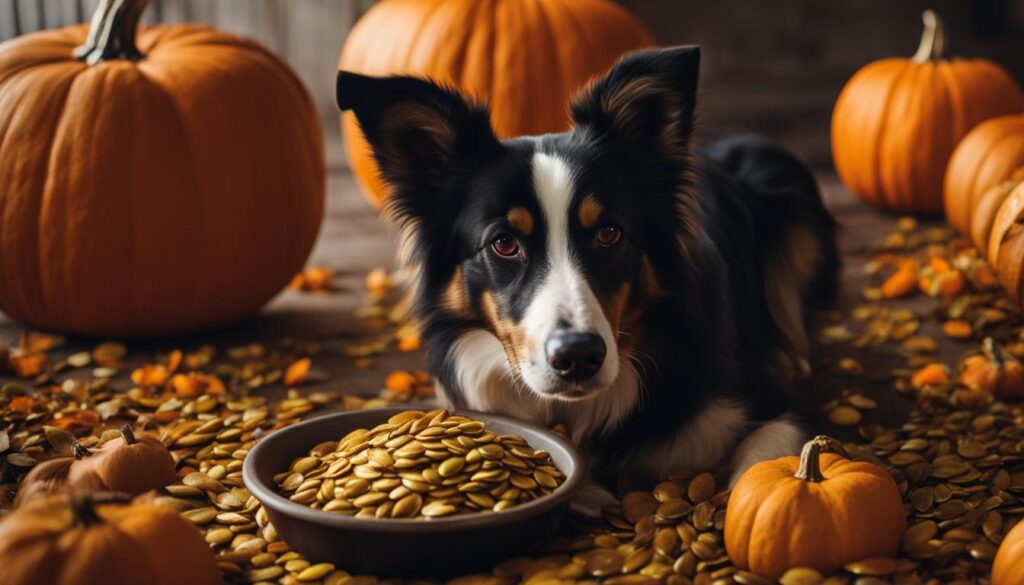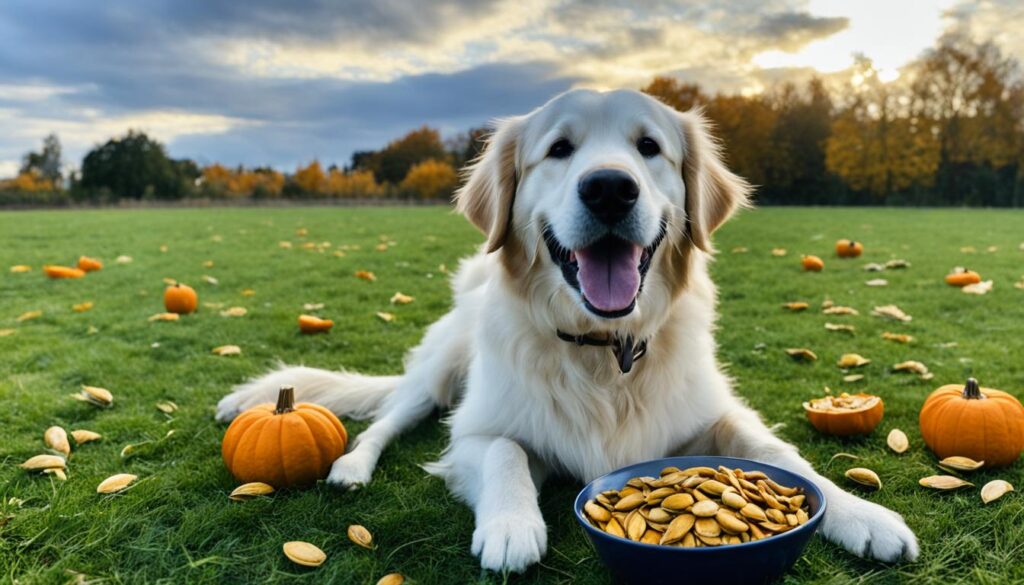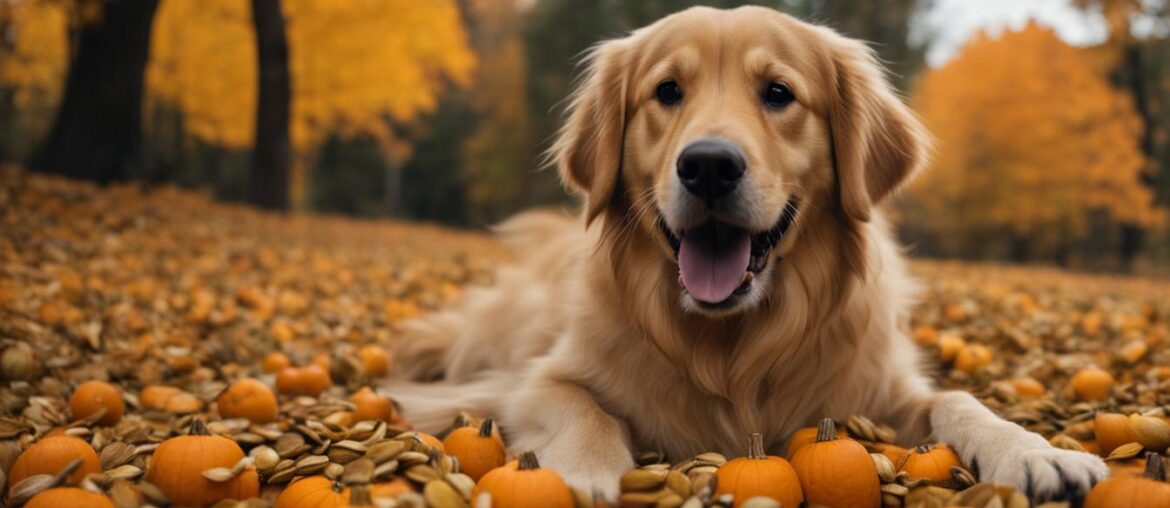Are you wondering if it’s safe to feed your dog pumpkin seeds? You’re not alone. Many dog owners are curious about whether pumpkin seeds are a healthy and suitable snack for their furry friends. The good news is that not only are pumpkin seeds safe for dogs to consume, but they also offer several health benefits.
Pumpkin seeds have anti-inflammatory properties that can benefit dogs with anal gland disease and promote intestinal health. These seeds are rich in magnesium, which can help relax respiratory muscles and open up airways. Additionally, pumpkin seeds support urinary health and provide essential omega fatty acids for healthy skin, joint function, heart health, and brain chemistry.
Pumpkin seeds are low in calories and packed with antioxidants and essential minerals like Vitamin A, C, Iron, Phosphorus, Magnesium, Zinc, and Folate. These nutritional qualities make pumpkin seeds a nutritious addition to your dog’s diet.
Key Takeaways:
- Pumpkin seeds are safe for dogs to eat and offer various health benefits.
- They have anti-inflammatory properties, support respiratory and urinary health, and provide essential omega fatty acids.
- Pumpkin seeds are low in calories and packed with antioxidants and essential minerals.
Are Pumpkin Seeds Good for Dogs?

Pumpkin seeds are a nutritious addition to a dog’s diet when fed in moderation. While they may not provide the same health benefits as they do for humans, they still offer some advantages for our furry friends. Pumpkin seeds are packed with healthy fats and omega-3 fatty acids, which are beneficial for a dog’s overall health. These seeds are also a good source of antioxidants, iron, and other essential nutrients that support their well-being.
However, it’s crucial to remember that feeding pumpkin seeds to dogs should be done in moderation. Excessive consumption can lead to digestive issues such as stomach upset, constipation, or diarrhea. To avoid these potential problems, it’s best to introduce pumpkin seeds gradually into your dog’s diet and monitor their response.
| Nutrient | Amount per 100g |
|---|---|
| Protein | 30g |
| Fat | 47g |
| Fiber | 18g |
| Iron | 14mg |
| Potassium | 919mg |
| Magnesium | 592mg |
| Vitamin K | 71.6mcg |
Health Benefits of Pumpkin Seeds for Dogs
- Healthy fats and omega-3 fatty acids promote a shiny coat and healthy skin.
- Antioxidants help support the immune system.
- Iron supports healthy blood circulation.
- Potassium aids in muscle and nerve function.
- Magnesium promotes strong bones and teeth.
Remember to always consult your veterinarian before making any significant changes to your dog’s diet, including the introduction of new foods like pumpkin seeds.
By providing your dog with pumpkin seeds as part of a balanced diet, you can contribute to their overall health and well-being. Just be sure to feed them in moderation and pay attention to your dog’s individual response. Enjoy exploring new ways to incorporate these nutritious seeds into your furry friend’s meals!
How to Safely Feed Pumpkin Seeds to Your Dog

When it comes to feeding pumpkin seeds to your dog, following certain guidelines is crucial to ensure their safety and well-being. Here are some tips on how to safely incorporate pumpkin seeds into your dog’s diet:
- Remove the shells: Before giving pumpkin seeds to your dog, make sure to remove the shells. Pumpkin seed shells can pose a choking hazard and may be difficult for dogs to digest.
- Raw or roasted: You can choose to feed your dog raw or roasted pumpkin seeds. However, it’s important to avoid adding any seasonings or cooking oils that can upset their stomach. Plain, unseasoned pumpkin seeds are the best option.
- Roasting method: If you decide to roast the pumpkin seeds, preheat the oven to 350°F (175°C). Spread the seeds on a baking sheet and roast them for 10-15 minutes. Remember to keep them plain and unseasoned.
- Grind into powder: To aid digestion, you can grind the pumpkin seeds into a powder before feeding them to your dog. This will make it easier for their system to process and absorb the nutrients.
- Recommended portion: The amount of pumpkin seeds to feed your dog depends on their size. As a general guideline, you can give them one pumpkin seed per 10 pounds of body weight. However, it’s always best to consult with your veterinarian for a more accurate serving size.
By following these steps, you can safely incorporate pumpkin seeds into your dog’s diet and provide them with the potential health benefits they offer.
Pumpkin Seed Recipes for Dogs

There are several homemade pumpkin seed recipes that can be enjoyed by dogs. One popular recipe is pumpkin seed dog treats. Here’s a simple recipe to try:
Ingredients:
- 1 cup raw pumpkin seeds
- 1/4 cup apricots or shredded carrots
- 1/2 cup plain unsweetened applesauce
- 1/4 cup smooth peanut butter
- 1 large brown egg
- 2 cups whole wheat flour
To start, preheat your oven to 350°F. Begin by roasting the pumpkin seeds until they turn golden brown. Once cooled, grind the pumpkin seeds into a fine powder using a food processor or blender.
In a mixing bowl, combine the ground pumpkin seeds, apricots or shredded carrots, applesauce, peanut butter, and brown egg. Mix well until the ingredients are thoroughly combined.
Gradually add the whole wheat flour and continue mixing until a firm dough forms.
Next, lightly flour a clean surface and roll out the dough to a thickness of about 1/4 inch. Use a dog bone-shaped cookie cutter to cut out the treats.
Place the treats onto a baking sheet lined with parchment paper. Bake in the preheated oven for 15-25 minutes or until the treats are golden brown and firm to the touch.
Once baked, allow the treats to cool completely before serving them to your furry friend. Store the treats in an airtight container to maintain freshness.
| Ingredients | Quantity |
|---|---|
| Raw Pumpkin Seeds | 1 cup |
| Apricots or Shredded Carrots | 1/4 cup |
| Plain Unsweetened Applesauce | 1/2 cup |
| Smooth Peanut Butter | 1/4 cup |
| Large Brown Egg | 1 |
| Whole Wheat Flour | 2 cups |
The Risks of Feeding Pumpkin Seeds to Dogs

While pumpkin seeds are generally safe for dogs, it is important to be aware of the risks associated with feeding them. Feeding too many pumpkin seeds to dogs can lead to stomach upset, constipation, or diarrhea. Additionally, dogs may be at risk of developing pancreatitis due to the high fat content in pumpkin seeds.
To ensure the health and safety of your furry friend, it is crucial to monitor the amount of pumpkin seeds given to them. If your dog experiences any negative side effects such as digestive issues or discomfort, it is recommended to stop feeding them pumpkin seeds immediately.
Consulting with a veterinarian before making any changes to your dog’s diet is always recommended. They can provide personalized advice based on your dog’s specific needs and health conditions.
Remember, moderation is key when it comes to feeding pumpkin seeds to your dog. It’s always best to err on the side of caution and prioritize your dog’s well-being.
Can Pumpkin Seeds Kill Worms in Dogs?

Feeding pumpkin seeds to dogs is not an effective or humane way to treat worms. While some articles claim that pumpkin seeds can eliminate worms, this is a myth. Feeding large amounts of pumpkin seeds may cause diarrhea, which can temporarily expel some worms, but it does not eliminate the infestation. The only proven way to treat intestinal parasites in dogs is to consult with a veterinarian and obtain a prescription dewormer medication.
Debunking the Pumpkin Seed Myth
It’s important to separate fact from fiction when it comes to using pumpkin seeds as a deworming method for dogs. While pumpkin seeds do contain certain compounds that have been shown to have antiparasitic effects in laboratory studies, the levels of these compounds are not sufficient to effectively treat or kill worms in dogs.
“Feeding large amounts of pumpkin seeds to dogs may result in the expulsion of some worms, but it is not a reliable or recommended method for deworming. Dogs with a moderate to severe worm infestation require a targeted and specific dewormer medication prescribed by a veterinarian.”
Consulting a Veterinarian for Effective Treatment
If you suspect that your dog has worms or if you are seeking an effective deworming treatment, it is crucial to consult with a veterinarian. A professional veterinary evaluation can accurately diagnose the presence of any parasites and prescribe the most appropriate dewormer medication for your dog’s specific needs.
Dewormer medications are designed to target and eliminate a wide range of intestinal parasites, including roundworms, hookworms, tapeworms, and whipworms. These medications are safe and effective when used as directed by a veterinarian, providing a comprehensive approach to deworming that goes beyond the limited effects of pumpkin seeds.
The Importance of Regular Deworming
Deworming is an essential part of a dog’s preventive healthcare routine. Even dogs that appear healthy and show no visible signs of worms can still harbor these parasites, which can negatively impact their overall health and well-being. Regular deworming helps to eliminate any existing parasites, prevent reinfection, and protect both your dog and your family from potential health risks.
Key Takeaways
- Feeding pumpkin seeds to dogs is not an effective or humane way to treat worms.
- Pumpkin seeds may cause temporary expulsion of worms through diarrhea, but they do not eliminate the infestation.
- Consulting a veterinarian and obtaining a prescription dewormer medication is the only proven method for treating intestinal parasites in dogs.
- Regular deworming is crucial for maintaining your dog’s health and preventing parasite-related issues.
| Myth | Reality |
|---|---|
| Pumpkin seeds can kill worms in dogs | Feeding pumpkin seeds to dogs does not effectively eliminate worms |
| Pumpkin seeds are a reliable deworming method | Dewormer medications prescribed by a veterinarian are the recommended treatment |
| Feeding large amounts of pumpkin seeds is sufficient to treat worms | Pumpkin seed consumption may only cause temporary expulsion of some worms |
Pumpkin Treats and Pumpkin-Flavored Dog Treats

If you prefer not to prepare homemade pumpkin seed treats for your dog, there are plenty of commercially available options. Many pet stores offer pumpkin-infused or pumpkin-flavored dog treats that are specifically formulated for dogs. These treats are often made with real pumpkin and other natural ingredients. Some popular options include:
- Blue Buffalo Health Bars with pumpkin and cinnamon
- Fruitables’ Pumpkin & Blueberry Dog Treats
- Charlee Bear’s Grain-Free Pumpkin and Chicken Dog Treats
- Hill’s Pumpkin and Duck Dog Treats
- Portland Pet Food Company’s Twice-Baked Pumpkin Biscuits
These commercially available pumpkin treats for dogs provide a convenient and tasty way to include the nutritional benefits of pumpkin in your furry friend’s diet. Whether you choose pumpkin-infused biscuits, pumpkin and blueberry treats, or grain-free pumpkin and chicken snacks, you’ll be able to provide your dog with the delicious flavors of autumn.
Wrapping Up
In conclusion, including pumpkin seeds in your dog’s diet can provide numerous health benefits. These seeds are rich in essential nutrients, including magnesium, omega fatty acids, and antioxidants, which support various aspects of your dog’s well-being. From promoting respiratory health to enhancing urinary function and maintaining healthy skin and joints, pumpkin seeds have a lot to offer.
However, it’s crucial to ensure proper feeding practices to keep your dog safe and healthy. Always feed pumpkin seeds to your dog without the shells, as this can pose a choking hazard. Additionally, be mindful of the portion size and avoid adding any salt or seasonings that may upset your dog’s stomach.
If you’re considering introducing pumpkin seeds or any new food into your dog’s diet, consulting with a veterinarian is highly recommended. They can provide tailored advice based on your dog’s individual needs and medical history. Remember, what’s beneficial for one dog may not be suitable for another, so professional guidance is essential.
By following these guidelines and incorporating pumpkin seeds into your dog’s diet in a safe and balanced manner, you can provide them with a nutritious treat that supports their overall health and well-being.
FAQ
Can dogs eat pumpkin seeds?
Yes, dogs can eat pumpkin seeds. They are not only safe for dogs but also offer numerous health benefits.
Are pumpkin seeds good for dogs?
Yes, pumpkin seeds are good for dogs. They contain healthy fats, omega-3 fatty acids, antioxidants, iron, and other nutrients.
How can I safely feed pumpkin seeds to my dog?
To safely feed pumpkin seeds to your dog, remove the shells, avoid adding salt or cooking oils, and consider grinding them into a powder for easier digestion.
Are there any dog-friendly pumpkin seed recipes?
Yes, there are several homemade pumpkin seed recipes for dogs, such as pumpkin seed dog treats.
What are the risks of feeding pumpkin seeds to dogs?
Feeding too many pumpkin seeds to dogs can cause stomach upset, constipation, diarrhea, or even pancreatitis.
Can pumpkin seeds kill worms in dogs?
No, feeding pumpkin seeds to dogs is not an effective way to treat worms. Consult with a veterinarian for proper deworming medication.
Are there commercially available pumpkin treats for dogs?
Yes, there are plenty of commercially available pumpkin-infused or pumpkin-flavored dog treats specifically formulated for dogs.
Wrapping Up
Pumpkin seeds can be a healthy and safe snack for dogs when fed in moderation and without shells or added seasonings. Consult with a veterinarian before introducing pumpkin seeds or any new food into your dog’s diet.






